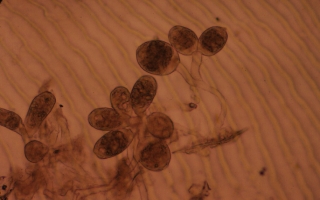 epistylis
epistylis
 epistylis
epistylis
Epistylis sp.
Epistylis sp. is a stalked colonial protozoan that occasionally has been recognized growing in small patches on damaged area of the skin or fins of tilapia from freshwater in Hawaii. Epistylis sp. colonies appear as raised white tufts. The organism is a filter feeder that sieves small algae and bacteria from the water. Thus, Epistylis sp. thrives in nutrient rich water, an environment that supports a large number of microorganisms. The organism can be found attached to rocks, leaves or other substrate and is not an obligate parasite of fish. In fact, Epistylis sp. may die off if transferred to clear, clean water for a period of time. An immature stage of the parasite can detach from the stalk and will swim freely to a new substrate to start a new colony.
Epistylis sp. are easily recognized microscopically because they are cup or tulip shaped protozoans that are attached to the surface of the tilapia by branching stalks. These protozoans have cilia around the rim of the open (apical) end of the "bell". Individuals may be seen to contract to a ball-shape and younger stages may detach from stalks and swim away.The stalks of Epistylis sp. are non-contractile, but do recoil for other types of similar appearing protozoa. the branches of the colony do not contract Epistylis sp. found on tilapia in Hawaii is about 0.05mm. The colonies, however, are large enough to be visible with the naked eye as soft, fluffy growths protruding from sores on the surface of the fish.
Epistylis sp. can be treated effectively with commonly used chemicals for control of protozoan ectoparasites of fish. These chemicals, however, have not been approved for use with tilapia by the FDA. Salt baths may be effective for control of Epistylis sp. on tilapia. For further information on treatment, proceed to the Treatment Section of this program or consult with the Disease Specialist for additional assistance.
| file: /Techref/other/pond/tilapia/epistylis.htm, 2KB, , updated: 2014/7/18 12:39, local time: 2025/6/29 23:14,
216.73.216.196,10-1-0-7:LOG IN
|
| ©2025 These pages are served without commercial sponsorship. (No popup ads, etc...).Bandwidth abuse increases hosting cost forcing sponsorship or shutdown. This server aggressively defends against automated copying for any reason including offline viewing, duplication, etc... Please respect this requirement and DO NOT RIP THIS SITE. Questions? <A HREF="http://sxlist.com/Techref/other/pond/tilapia/epistylis.htm"> Tilapia Topic: Disease Vectors</A> |
| Did you find what you needed? |
Welcome to sxlist.com!sales, advertizing, & kind contributors just like you! Please don't rip/copy (here's why Copies of the site on CD are available at minimal cost. |
|
The Backwoods Guide to Computer Lingo |
.